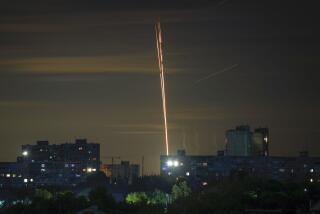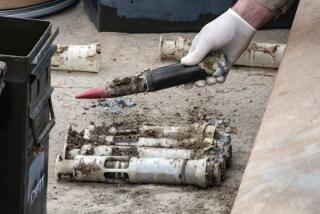Yeltsin Vows Aid in Probing Nuclear Contraband Cases : Russia: The president’s promise in a letter to German Chancellor Kohl contrasts with Moscow’s denials that it is the source of smuggled plutonium.
BONN — Russian President Boris N. Yeltsin has written to German Chancellor Helmut Kohl promising Moscow’s cooperation in investigating recent cases of nuclear contraband seized in Germany, a Bonn spokesman said Wednesday.
The letter was the first direct offer of help from the Russian government, which has publicly denied German assertions that Russia is the source of nuclear materials seized in Germany over the last four months.
The two leaders are friends, and Kohl had written to Yeltsin last weekend. Bernd Schmidbauer, Kohl’s minister overseeing intelligence services, is to fly to Moscow this weekend with the results of scientific examinations of the samples to discuss the smuggling issue.
The European Atomic Energy Commission in Luxembourg said on Wednesday that at least two of the plutonium samples almost certainly originated in Russia and that at least one of them came from a nuclear weapons facility.
Wilhelm Gmelin, director of the European Safeguards Directorate at the commission, said an analysis of six grams (0.2 ounce) of plutonium found in the garage of a salesman in the southwestern state of Baden-Wurttemberg last May showed “the chances are very high that it is from weapons material.”
Gmelin said the plutonium was mixed with a substance called gallium, “which normally is not used in any civilian application.”
Adolf Jaeckle, the salesman, originally was arrested on suspicion of counterfeiting. German television’s NDR network reported that police found the cards of two Russian scientists from Moscow’s Kurchatov Institute in Jaeckle’s apartment.
Gmelin and the Bavarian state interior minister have said 10.7 ounces of plutonium-239 seized in Munich also apparently came from Russia and was produced for use in weapons. That cache was discovered in a suitcase on a Lufthansa flight from Moscow, and three passengers, two Spaniards and a Colombian, were arrested. The sample proved to be 87.2% pure plutonium-239--which, Gmelin said, “rules out any civilian use in the European Community.”
But Gmelin warned that, even as experts narrow the origins of the plutonium samples, they do not necessarily know how or from which facilities they made their way onto the black market.
Plutonium is used in Russia for making nuclear weapons. It is also a byproduct of atomic energy production in plants that use enriched uranium. Russia has specialized industrial uses for plutonium, such as smoke detectors and pacemakers, and does civilian as well as military research with the radioactive element.
In an interview with the weekly newspaper Die Woche, a Russian official charged with cleaning up the Chernobyl nuclear power station after it exploded in 1986 warned that more nuclear material than suspected may already have been smuggled out of Russia.
“Nobody can control this atomic smuggling,” Vladimir Chernosenko told Die Woche. “This industrial sector was traditionally controlled by the KGB. . . . Now those structures have fallen away and there is no more control.”
In Moscow, the government continued to publicly deny that any plutonium is missing from Russian facilities and to charge that Germans have political motivations for exaggerating the smuggling issue.
On the Munich seizure--the largest illegal plutonium cache ever discovered--Yuri A. Rogzhin, spokesman for Russia’s Federal Inspectorate of Nuclear and Radiation Security, said, “I think that this action is purely political.
“The passengers were detained before they approached customs. This shows that the German special services knew about the cargo,” he said. “The fact that the Germans did not get in touch with us proves that they do not want to settle and investigate this incident.”
But Valery F. Davydov, an independent Russian non-proliferation specialist, said nuclear security is the most sensitive issue in Russia and that an independent assessment of the problem is unlikely.
“All specialists are tied to secret and semi-secret ministries and are afraid to say something that will not be in line with official policy,” Davydov said.
Some political commentators in both countries have suggested that the German government is using the issue to bolster Kohl’s reelection campaign and strengthen his bid for a German seat on the U.N. Security Council.
Kohl’s envoy, Schmidbauer, briefed the multi-party Parliamentary Control Commission on the smuggling issue behind closed doors Wednesday morning. German television’s ZDF network reported that he told the legislators “of offers and buyers, the involvement of former KGB connections and at least in one case of official Russian authorities.”
In Washington, Energy Secretary Hazel O’Leary said scientists with the U.S. National Weapons Laboratories have largely concluded that seized materials they have examined are of such high quality and grade that they could have come only from research facilities--not from the former Soviet arsenal.
Times staff writer Melissa Healy in Washington and Andrei Ostroukh of The Times’ Moscow Bureau contributed to this report.
More to Read
Sign up for Essential California
The most important California stories and recommendations in your inbox every morning.
You may occasionally receive promotional content from the Los Angeles Times.










